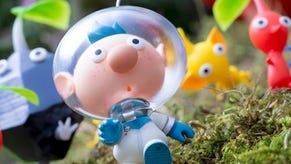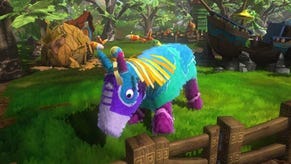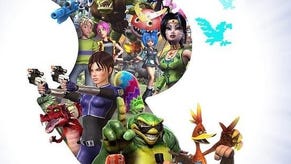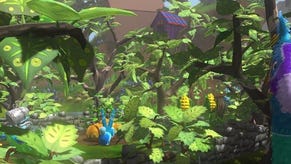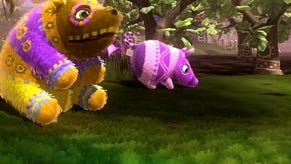Viva Piñata
A loving reminder that fun can be friendly.
We love violence around here. In the summer, we name all the ants crawling around the kitchen, marry them off and then squash them with a rolling pin called genocide. When cats get stuck in trees we send dogs up to retrieve them. We're not very nice people. But this time last year, even we found it hard not to fall in love with Rare's silly little game about building a garden home for cute little animals and then playing with them. The news that PC gamers can now share in our fun is jolly exciting, and even a week that saw Super Mario Galaxy, Mass Effect, Uncharted: Drake's Fortune and Crysis land on our desks found its evenings dominated by the soothing routine of coaxing and caring for things called Squazzils, Cocoadiles and Quackberries.
Viva Piñata pitches up largely unchanged from its Xbox 360 outing. Starting off with a crumbly plot of tattered land, you use a shovel to pat down the earth and smash up rubbish before laying down grass, planting a few seeds and watering them, and building houses for worms and sparrows - or Whirlms and Sparrowmints, to borrow from Rare's interminably saccharine Encyclopaedia of animal friends. (And why not "Pincyclopaedia", incidentally? Missed a trick, there, by the looks of it.) In a wickedly amusing twist, your first big job is making everyone have it off with each other in order to produce additional critters, and there's no barrier to having Mummy and Daddy abandon one another in favour of the pleasures of virtual incest, although the game - designed to appeal to children more than adults, in theory - obviously glosses over this.
A solid set of rules define whether animals visit your garden, decide to stay and are prepared to reproduce, but you're not told in advance how to attract them, which encourages you to experiment as the game opens up various options - new seeds, new garden furniture and varying animal homes among them. This you happily do, as each new animal is a lovingly crafted paper friend whose behaviour, homestead and mating dance is distinct from any other, and strangely delightful. Mothdrops live in giant lightbulbs, Quackberries live in a little pirate ship, and Doenut deers retreat to a flashy looking disco whenever darkness falls. Every sexing dance is backed by its own music and dance video, and one of the game's greatest strengths is that every one of its dozens of animal friends has been lavished with as much graphical and musical attention as any other.
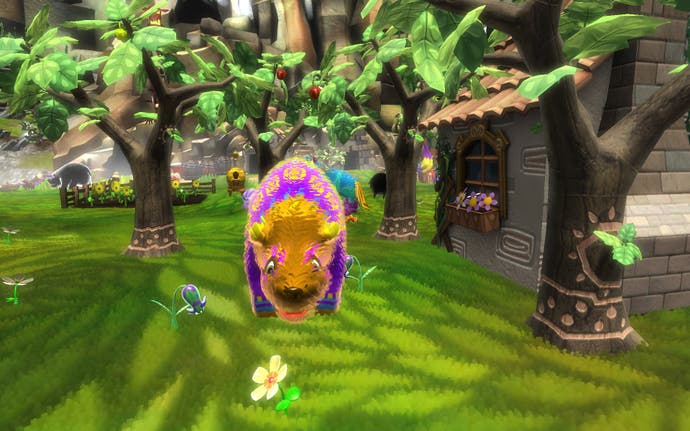
The routine that emerges is alarmingly moreish. As a new and exciting animal takes an interest in your work, you scour the Encyclopaedia for information and then try and manage your buying, selling and breeding so that you can accumulate the right balance of objects and residents to make them join you permanently. Residency and breeding requirements gradually become more challenging, and complications like sour piñata - devilish red animals who invade and poison your piñata until you've blocked their entry or given them reason to stay - blend in with an ever-diversifying range of shops, seeds and inter-species squabbles to mask the rhythm and repetition of your endeavours. There are a multitude of possible approaches available at any given time, and a host of contingent and extraneous elements to incorporate into your landscaping and cultivating. Whether you're simply interested in seeing new things, getting the most out of your little animal friends (by finding ways to evolve them or even, in one case, cross-breed them) or just keen to create a garden that's easy on the eye, you're never lost for something different and interesting to work towards.
Some of the things you aspire to are distinctly laboured, and while the clock speeds up at night there's still a lot of sitting around waiting for things to bloom, befriend or battle, but it's entirely forgivable once you're caught in the game's spell, and the splendid coherency of Rare's original art design and particularly the sound department's wonderful range of accompanying music are enough to see you through the quieter spells. Rare - whose work has been ported to PC by Climax - made certain to populate the game with all sorts of hidden tricks and unexpected bonuses too, like a beardy beggar who it's well worth compensating for his plight, snakes whose eggs behave strangely for what turns out to be a delightful reason, and a wonderful array of gardening aids, like various fertilisers, that are well worth spending a bit of time playing around with to see what's possible but not advertised.
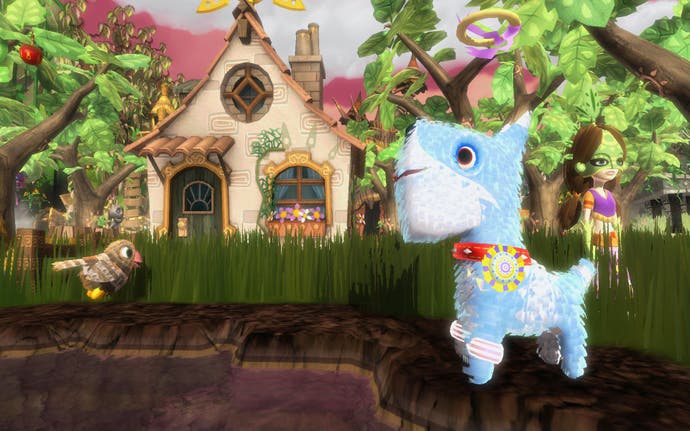
On the downside, the porting process - often the bane of PC gamers who are forced to wait a long time to play celebrated console games - hasn't been as kind as it might have been. "Games for Windows - LIVE" is the order of the day, and like Gears of War, some early adopters have experienced problems with crashes and quirks of Microsoft's fledgling - and rather restrictive - attempt to force Xbox Live down the throats of PC owners. The unlockable Achievements push you toward certain goals you might not otherwise consider, but it's a high price to pay. The control scheme, too, rather pales when it's thrust into the context of hundreds of much better PC management games. The mouse is used to select things, but also - in combination with WSAD - pitch, turn and move the floating camera, and the interface is an initially awkward affair that is geared towards using the mouse-wheel to reassign Xbox button colours to the left button on the fly, which is a frankly bizarre substitute for simply building a more suitable control scheme. The fact that a management game designed around an on-screen selection cursor is much better when you plug in a dual-stick analogue game controller (like the Xbox 360 Controller for Windows, coincidentally) is bound to baffle and annoy people who are used to much better alternatives.
The menus, too, are borrowed entirely from the 360, and still rather clumsy. Text boxes aren't resized even if you're playing in the highest possible resolution, so ten-word sentences involve scrolling (and not by wheeling down, either, but by clicking arrows), and having to go back and forward between shop screens, Encyclopaedia screens, information screens and the main gameplay screen, using menus that take a fraction of a second too long to respond, breeds discontent - not assisted particularly by the game's initial bombardment of silly alerts and confusing announcements. Distaste for this should subside once you get into your stride, but it's worth bearing in mind. This is a better game to play on an Xbox 360 controller, by design, and the PC porting process has done the bare minimum to ingratiate itself with people who prefer to play games in the study rather than the lounge.
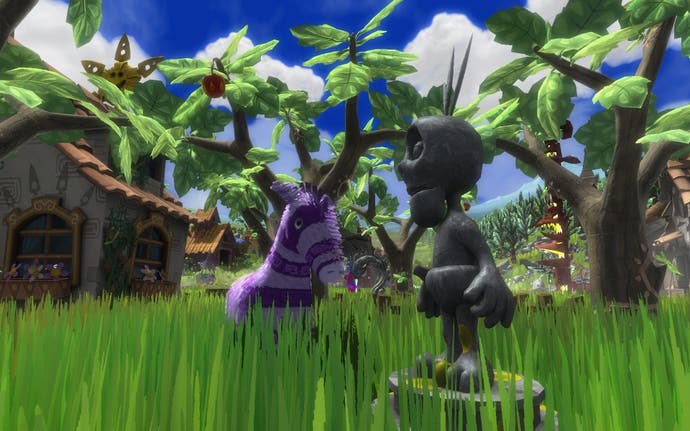
Still, it's a testament to the game's enduring qualities that you can overlook these things and still lose endless evenings to the pursuit of Galagoogoos, Twingersnaps, Roarios, shovel upgrades, picket fences and fully grown jewel trees. Those who play long enough to capture the elusive and coveted Dragonache will look back on their journey with a fondness and warmth quite at thoroughly odds with the majority of gaming experiences available to them away from the world of Viva Piñata. More elegance in the interface, fewer lulls in activity and a better way of gently directing you towards its hidden delights would have carried the score higher, but even with its flaws Viva Piñata is a game that deserves to be played and refreshes your belief that games can be friendly as well as fun. Give it a go, and give Microsoft incentive to commission more of these interesting and unusual concepts that its talented coven of in-house developers clearly enjoy making.



